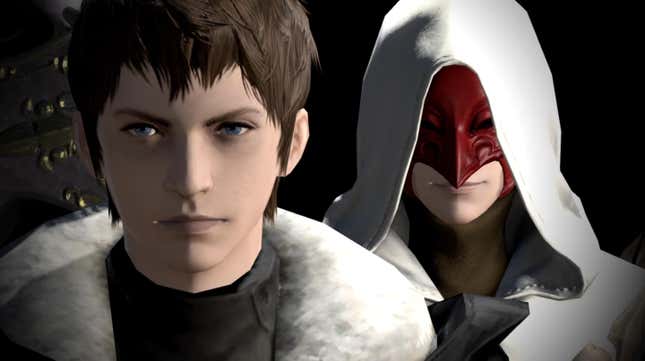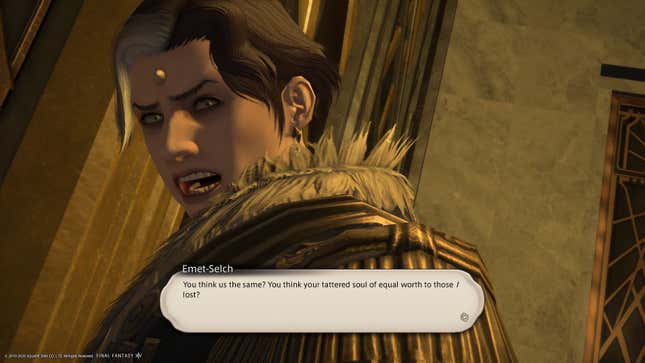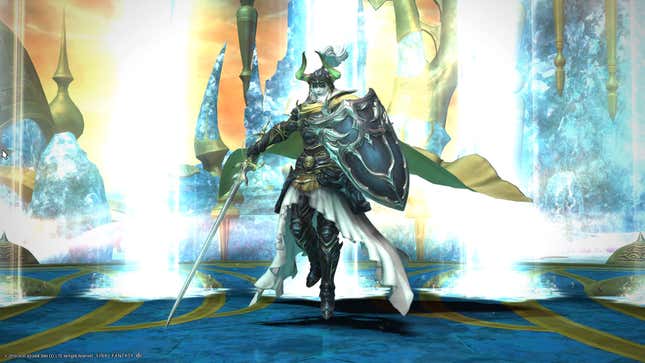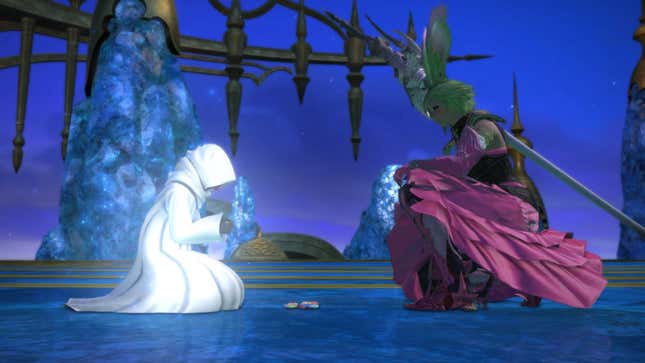
Be it Sephiroth or Seymour, Zemus or Kuja, Kefka or a weird evil tree, Final Fantasy does not lack for classic villains. And while some of Final Fantasy XIV’s may not be as well-known, the MMORPG enjoys a particular knack for humanizing even the most heinous antagonists, and its latest is no exception. FFXIV’s patch 5.3, Reflections In Crystal, gives us one of the most brilliant antagonists yet in Elidibus, a fascinating character with a compelling and metatextual emotional arc I haven’t been able to stop thinking about since launch day.

Elidibus has played a part in FFXIV’s story since the game’s relaunch as A Realm Reborn, but until the last couple patches, mostly kept to the shadows, working as a member of the mysterious cult of the Ascians. Throughout FFXIV’s past expansions, we as the Warrior of Light (later the Warrior of Darkness) have slain countless deities, waged war against ancient dragons, dueled to the death with bloodthirsty cyberpunk samurai twinks, and kept deadly light from consuming an entire world. And in one way or another, the Ascians were behind it all.
God-like beings and the survivors of the first civilization, the Ascians’ world was destroyed in a great conflict between the primal deities they created, dividing the planet and the souls of its inhabitants across 14 parallel shard-worlds. The only truly whole beings left, the Ascians now sow chaos across the realms in an effort to rejoin the worlds and bring their people back, even at the cost of all other living creatures.
Though serving as one of the Ascians’ leaders, until now Elidibus mostly just deceived heroes and manipulated world events while hanging out on the moon, making him honestly kind of boring. But with Shadowbringers’ end and the death of Emet-Selch—the last of his remaining brethren, and an all-around stinky skunk boy—Elidibus takes center stage, his character finally beginning to coalesce as his thoughts turn to vengeance. He, like his departed comrades, views humanity’s current state as a frail and pathetic fragment of what his people once were. However, he lacks the other Ascians’ straightforward douchebaggery. He’s polite. He’s patient. He’s devoted to his mission. He is really into saying his own name a lot.
Over the last several patches, Elidibus utilized his charms and wit to not only play his enemies, but manipulate the people like a politician. He possessed the body of a fallen Warrior of Light, positioned himself as a messianic figure, and conjured visions of ancient starshowers to inspire hope in the masses and convince them they too are Warriors of Light. While empowering a people that have struggled appears noble, his actions play not only with our character’s sense of identity, but the major conceit of the RPG genre, wherein millions of players are told that they are the chosen hero meant to save the world.
Memories & Reflections
The Shadowbringers expansion has largely been about learning the history of FFXIV’s universe, but 5.3, its climactic closing chapter, is instead focused on the dual themes of memory and identity, and how they interact.
The first major battle of the patch sees Elidibus taking us on a journey through a city built from our personal history, making us fight our way through monsters shaped like the friends and enemies we made across the game.
Throughout, he reframes our actions to seem motivated by bloodlust rather than kindness: an act of courage painted as an act of revenge. Elidibus sees himself and his fallen brothers as the true heroes of this story, while your Warrior of Darkness (née Light) stands in the way of his saving the world.
Elidibus’ obsession with our memories is matched only by his unrelenting fixation on his mission. We learn that when his world faced annihilation, he sacrificed himself to serve as the heart of the first primal, Zodiark. Primals are man-made gods, driven and powered by the presiding desire of the people who summoned them, and Zodiark was created by the Ascians’ wish for their world’s salvation. And while Elidibus removed himself from Zodiark, he is no longer the man he once was. Though he derides the fragmented humans for their imperfect natures and fleeting memory, he himself is but a fragment of Zodiark. Though he is committed to his promised duty as “the true savior of the star,” he can’t even recall the faces of those he swore to save, or why he still fights.
Elidibus is all the more fascinating when compared to his predecessor, Emet-Selch. Eccentric, chatty, and largely unpredictable, Emet-Selch would save your friends’ lives one second, and try to turn you into an eldritch abomination the next. But behind all the theatrics was an ageless man who hid great pain and unparalleled power. Spending thousands of years burdened with grief, his true disposition was that of a man stuck in hell, having lost the people he loved and the world he remembers as a perfect paradise. Emet-Selch was willing to do anything to get it all back, even if it meant the death of billions. His bombastic personality and tragic backstory (not to mention the fact that the player character is pretty much confirmed to be the fractured soul of his best friend/lover) is part of what made Emet-Selch such an iconic adversary.

And while the two share the same trauma and goals, the two Ascians, particularly the forces that drive and hinder them, couldn’t be more different. Where Emet-Selch clung to nostalgia, Elidibus doesn’t even have that to draw on. Instead he remains feverishly obsessed with completing his job. All Elidibus has is his identity as a soldier, determined to keep marching onward despite the apparent futility of the war he fights.
At one point, Elidibus gives the player a typical “we’re not so different, you and I” villain speech, and befitting the title Reflections in Crystal, Elidibus does serve as our reflection in many ways. He was a chosen hero and a symbol of hope to the Ascians, as we are to the people of Eorzea and Norvrandt. We are both motivated by a sense of duty to the people we cherish but the lengths to which he’ll go to achieve his motives is where his villainy is born. He doesn’t act out of evil, but believes that any means is justified as long as his people are restored. In Elidibus, FFXIV asks “what would it take to make a Final Fantasy protagonist the baddie?”
In our final battle, his heroic self-image is given form when he, empowered by stolen prayers of peoples across the realms, takes the shape of “mankind’s first salvation and final hope,” the world’s original Warrior of Light. Wielding a sword and shield and adorned in blue and gold-horned armor, he appears as a recreation of the light warrior in Yoshitaka Amano’s art for the original Final Fantasy. But the metatextual references don’t end there.

Throughout the eight-man boss fight he summons party members and deploys a weapon players are all too familiar with: limit breaks. We watch the Warrior of Light/Elidibus (or WoLidibus) fill his own limit gauge again and again, putting us on the receiving end of some of our most powerful offensive abilities. These shocking attacks, the guitar-chugging track by Masayoshi Soken, and my party’s collective excitement—particularly at a mind-blowing twist halfway through the fight that surprised some people so much they happily wiped—made this some of the most genuinely exciting gameplay I’ve enjoyed in recent memory.
During the fight’s second phase WoLidibus unleashes an ultra-powerful limit break that can only be survived if a tank uses your party’s shared limit break, granting a heavy defensive buff to the entire team. In dungeons and trials, limit break usage is typically reserved for healers and damage-dealers, but here its rare defensive use serves a narrative purpose. Elidibus fights and struggles toward his goal with the same desperation we ourselves feel, but is disconnected from what he claims to fight for. He may think of us as simply a force of destruction, but our fight against him can only be won by remembering we have other people we must protect.
Duty’s End
In the end, we slay Elidibus and, deprived of his stolen power, he finally finds his true self again. In his real form he is reduced to the size of a child, and at long last able to recall those whom he lost and why he fought.
We learn that when the star faced destruction he did all he could to prevent it, giving his life to fuel his people’s salvation. When his people became ideologically divided, he separated himself from Zodiark in an attempt to reconcile and re-unify them. Emet-Selch carried on his people’s memory, but Elidibus couldn’t even do that, sacrificing every part of himself for his comrades until all that remained was his mission and his name. Now no longer consumed by his duty, he weeps, heartbroken that despite all he gave, it still wasn’t enough to save them.

There were several scenes in this patch that made me tear up, but none that stayed with me as strongly as Elidibus’ passing. I keep hearing his final words repeat in my head “Stay strong. Keep the faith. At duty’s end, we will meet again. We will. We will.” Whereas his attitude before belied a resolute confidence, here his voice cracks “The rains have ceased and we have been graced with another beautiful day. But you are not here to see it.” At a time when many of us are unable to share small moments with the people we hold dear, I can’t help but empathize.
Attack and Dethrone Sad Boy God
Toward Reflections’ end, everyone’s favorite crystal catboy G’raha Tia makes a grand speech about seeing hope at the root of everyone’s actions, including the enemies we’ve faced. He posits that this is why we struggle, and that holds true for Elidibus, Emet-Selch, and many other FFXIV antagonists (except Zenos, who remains a bishonen scumboy dictator). The tragedies they’ve suffered never feel as though they are meant to justify their actions and goals, but to let us understand what shaped those we couldn’t avoid conflict with.
In the end, the Warrior of Light/Darkness always embraces the totality of their enemies, and mourns them as they do their fallen friends, recognizing their motives as deeply human. As enthralled as I am by monstrous villains like Sephiroth and Kefka, there’s power and beauty in giving players an emotionally realized enemy who, though capable of unspeakable harm, is motivated by more than destruction, evil, or—lookin’ at you, Final Fantasy VIII—wanting to squish together time and space.
Chingy Nea is a writer, comedian, and critically acclaimed ex-girlfriend based out of Oakland and Los Angeles.